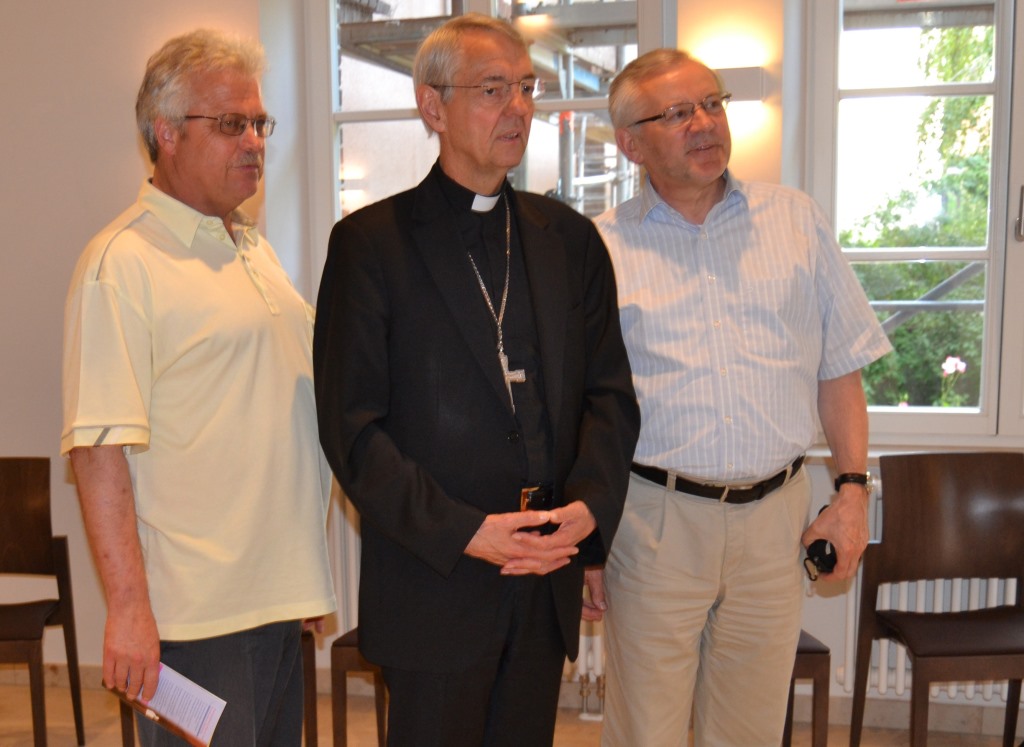Daniel Comboni
Comboni Missionaries
Institutional area
Other links
Newsletter
Rome, Saturday, August 3, 2013
On July 15-22, twelve Comboni bishops gathered at the new provincial house of the Comboni Missionaries in Nuremberg, Germany for the customary exchange of experiences. The Comboni Bishops gather once a year in a different Comboni province in order to foster a greater mutual knowledge and of the provinces as well. In the picture from left: Bro. Friedbert Tremmel; Mons Ludwig Schick, Archbishop of Bamberg, Fr. Josef Altenburger, provincial superior of the DSP.
Just looking at the countries they come from, one has an idea of how greatly diversified was the range of experiences related by each Comboni prelate. The bishops were coming from the following dioceses: Witbank/South Africa; Huánuco/Peru; Esmeraldas/Ecuador; Bangassau/CAR; Kotido/Uganda; Lira/Uganda; Apostolic Vicariate of North Arabia; Hawassa/Ethiopia; Cittadella/Italy (bishop emeritus of El Obeid); Laï/Chad; Doba/Chad; Tilarán/Costa Rica.
Various dioceses, started and grown by Comboni bishops, are now autonomous local Churches, not only led by local prelates, but also sending their missionaries ad gentes. The most common difficulties of these young Churches concern the financing of education, the upkeep of the clergy and other pastoral agents and the maintenance of ecclesiastical infrastructures.
The bishops of the CAR and of the Vicariate Apostolic of North Arabia spoke of these and of other difficulties of a totally different nature. Bishop Juan José Aguirre of Bangassou (CRA) spoke of the terrible experiences encountered in his diocese during the recent armed conflict in the country. The Seleka rebels, several of them being mercenaries from neighboring countries, and gangs of young people without a future invaded the country and overthrew the government.
During the rebellion practically all the missions were looted. The young Muslim men who were traveling with the rebels showed them which homes to attack, destroy and burn. In any case, the missionaries have already started some activities aimed at moving the country towards reconciliation. In Dekoa, for example, a large forum of young people was held – which united, Christians, Muslims and young members of Seleka – to urge one another to forgive and reconcile. These young people ended up praying and eating together peacefully.
Bishop Camillo Ballin, vicar apostolic of North Arabia, said that practically Christians can gather for worship only in a clandestine way and are discriminated against simply because they are Christians. According to Bishop Ballin, dialog with Islam is extremely important, in particular in order to better know each other’s religion and the unifying elements, in order to avoid fanaticism and persecutions.
Archbishop Ludwig Schick of Bamberg, took advantage of the presence of the Comboni bishops in his archdiocese in order to pay them a visit and share some important and significant challenges of the German Church.





